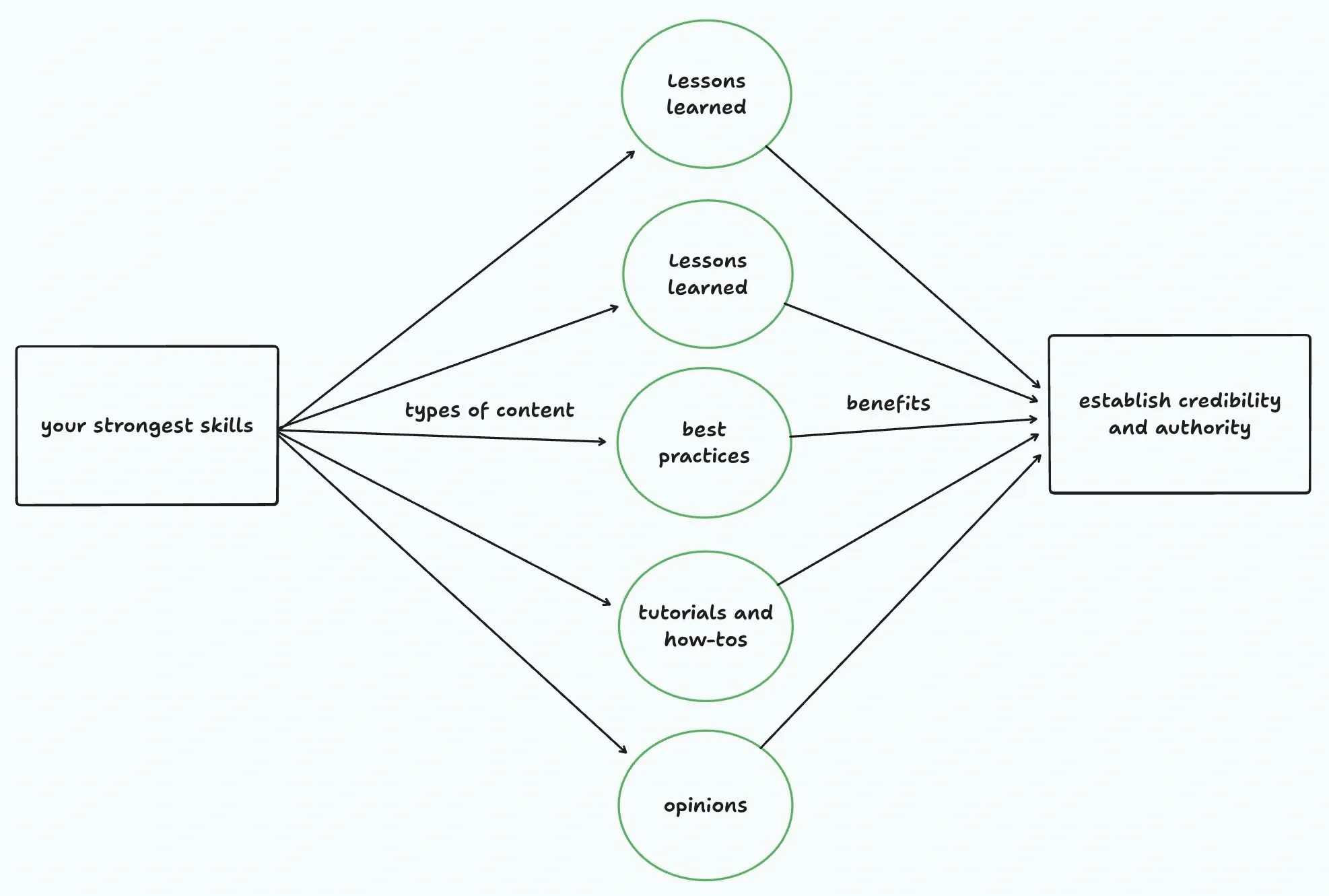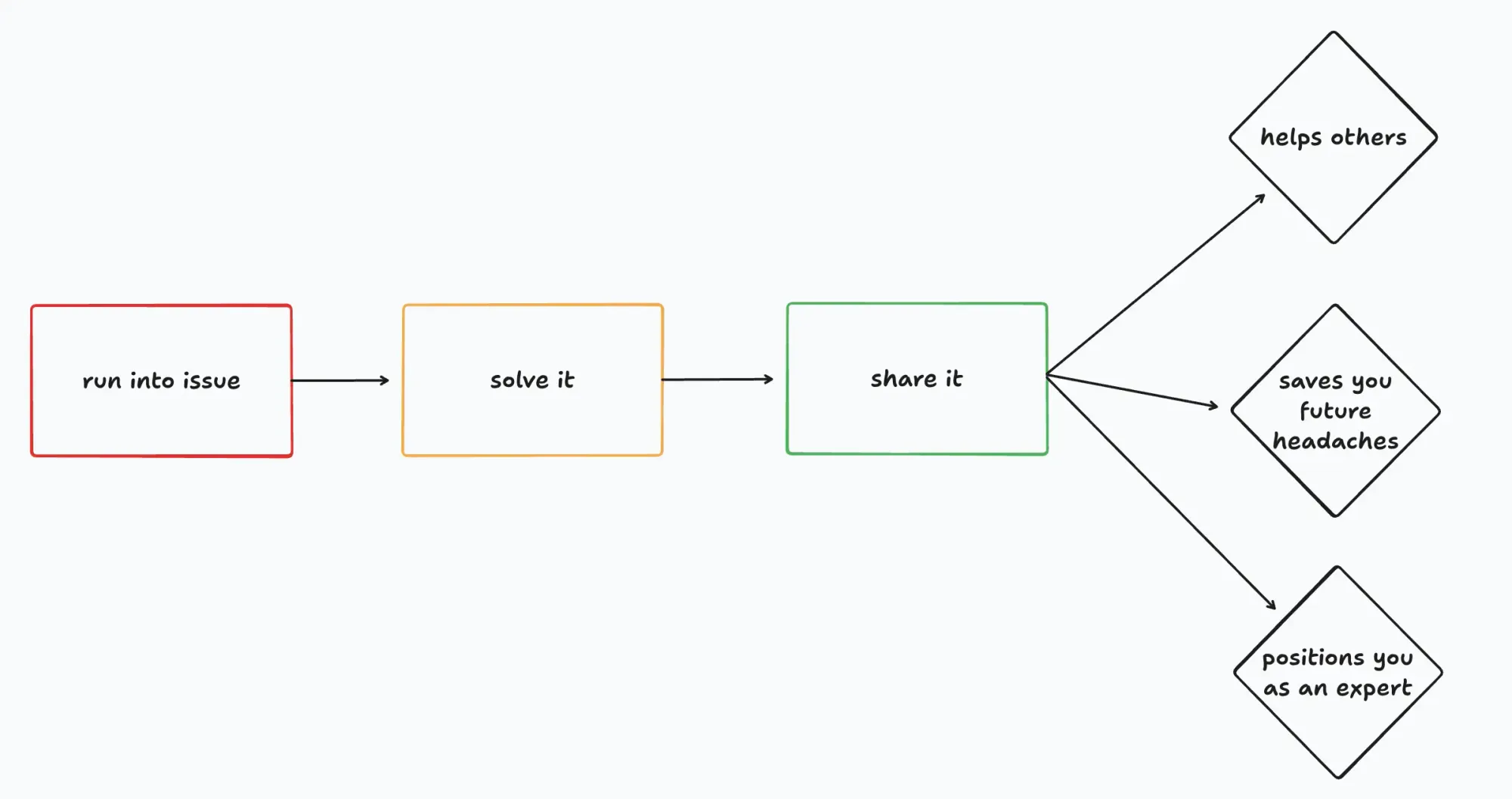The main challenge for writers (and content creators) is coming up with content ideas. You might be familiar with writer's block and the frustrating feeling of looking at a blank editor.
However, generating content ideas is not that difficult. Personally, I don't have time to talk about all the ideas I have.
So, in this article, I'll show you various strategies that you can use to never run out of ideas.
You can use these strategies to generate ideas for your blog, marketing materials, YouTube videos, career progression and opportunities, and so on. No matter what your profession is, this article will help you.
Write About Your Learnings
We're constantly discovering and learning new things.
Regardless of your title and level of expertise, you're always figuring things out. There are new concepts, tools, programming languages, methodologies and best practices to learn all the time. When it comes to writing and content creation, this ongoing learning process is a huge advantage because it gives you ideas for content.
Each time you learn something new, you have the opportunity to talk about it.

Moreover, you also improve your understanding of that subject. The process of explaining a concept forces you to break it down, test your understanding and anticipate questions or points of confusion for the readers.
"To teach is to learn twice"
This quote from the French essayist Joseph Joubert perfectly sums up the learning that happens when you explain something in your own words.
Firstly, it tests your understanding of the subject. Then, the second round of learning comes when you share your content publicly. Readers' feedback, questions, and discussions may help you see new perspectives, discover alternative approaches, and understand the limitations of your solution.
All this allows you to improve your knowledge.
Let's look at an example.
Imagine you've just learnt how to deploy an application to AWS using Docker. This complex process involves a range of AWS services, Docker and dev concepts. Since you've gone through the process yourself and the information is fresh on your mind, you can create content such as:
- How to prepare your Docker app for deployment
- A step-by-step guide to deploying a Docker application on AWS
- Optimizing your Docker deployment on AWS for cost and performance
- Continuous Integration and Deployment (CI/CD) for Docker on AWS
- Get started with Docker
- Get started with AWS
- What mistakes to avoid when deploying your app on AWS
These are only a few examples to show that you can generate many ideas from just one experience. And it comes with 2 benefits - you create valuable content for your audience and solidify your understanding of the subject.
Write About Your Expertise
Your knowledge and experiences are a great source of inspiration, so you should tap into that.
Here are various content types you should consider:
- Lessons learned: Reflect on your most difficult and successful projects. What lessons did you learn that could help other people? Consider creating "5 Lessons I Learned From Building X" or "What I Wish I Knew Before Starting Y Project" type of content.
- Best practices: As you gain more experience and expertise, you develop a set of best practices and guidelines that help you deliver high quality work. Share these in a "Best Practices for X" or "X Dos and Don'ts for Y" format.
- Tutorials and how-tos: Break down a complex process or concept from your expertise into a tutorial or how-to guide. Create the resource you wish you had when first learnt that skill.
- Opinion pieces: Share your thoughts on trends, debates, or new developments in your area of expertise. Are there approaches or frameworks on which you have a strong opinion? Controversial or popular best practices you disagree with? Upcoming trends? Share your opinion.
- Case studies: Dive deep into a specific project or initiative you led that showcases your competence. Share the challenge, your approach, the obstacles you overcame, and the results. Also share the mistakes and learnings, which can sometimes be more valuable than the rest.
Another benefit of sharing your knowledge is that it helps you establish credibility and authority in your niche.

That's why it's important to develop a habit of regularly reflecting on your work. The more you practice it, the easier it becomes to spot content opportunities in your day-to-day work.
Write About the Issues You Solve
As a technical person, you're regularly dealing with issues, errors, and bugs, so it's yet another opportunity to create content.
You likely ran into the same issues or variants of the same problems repeatedly. Having to fix the same issues over and over is frustrating and time-consuming. How many times have you wished you had documented your solution somewhere?

From now on, consider documenting the solutions you implemented to solve issues and fix errors and bugs. A format for this type of content can be as follows:
- Introduction: Start by introducing the problem and providing context.
- Troubleshooting: The steps you took to identify the root cause of the problem.
- Solution: Present the solution you implemented.
- Impact and Lessons Learned: Close the article by talking about the impact of the chosen solution and any lessons learned.
By sharing the solutions to your problems, you help others experiencing the same issues. You also help your future self, as you will likely come across the same problem again. You can refer to your content instead of solving it again from scratch, saving you future headaches.
The image below shows an example with one of my articles.
In that article, I shared a solution to a problem I ran into in the past. Others faced the same problem, and my article helped them. It became the accepted solution for that GitHub issue.
Additionally, sharing your solutions can position you as an expert. It shows that you have a good understanding of the technologies you work with and you care about helping others too.
That can open new opportunities for collaborations, speaking engagements, or jobs. I know many people who have been approached for collaborations, work and giving talks based on the content they shared on the internet.
Generating content ideas based on the issues you solve is a win-win strategy:
- It helps you to document your solutions for future reference.
- It positions you as an expert in your field.
- You contributes to the tech community.
Write About Your Experiences
While technical writing focuses mainly on the technical aspects, sharing your tech-related experiences is also valuable for your audience.
These experiences are about your professional life, rather than the technical aspects of your job. Some examples are as follows:
- Your preparation for an interview.
- The habits you developed to become more efficient as an engineer.
- Tips for getting promoted faster.
- How to work remotely effectively.
Every experience is an opportunity to create content. You can share insights, guidance, and inspiration for others in similar situations through this type of content.
Content that talks about people's experiences in the industry is especially valuable because it's harder to find. The internet is full of technical content, but there isn't as much content about these non-technical aspects of working in tech.
In addition to helping others, writing about your experiences can also contribute to your own growth. The process of reflecting on your past experiences helps you better understand your strengths, weaknesses, and the lessons you've learned. It allows you to:
- Identify areas for improvement in your own work and career.
- Solidify the lessons you've learned.
- Get a clearer understanding of your goals.
Writing about your tech-related experiences allows you to create unique and valuable content that helps you and others in the industry.
Keywords Research
When the previous techniques for finding ideas are not enough, you can resort to the old, reliable keyword research method.
Keyword research is the process of identifying and analyzing the words and phrases that people search for online. The purpose of keywords research is to create content that increases your traffic via search engines.
When doing keyword research, you'll look at the following metrics:
- Volume: The number of searches for that particular keyword in a month. A higher volume indicates that more people search for that keyword, which has a higher potential for traffic.
- Difficulty: How competitive it is to rank for that keyword in search results. Higher difficulty means appearing in the search results (or at least in the first results) is harder.
- CPC (Cost per Click): The amount you'd need to pay the search engine for each click on your ad from the search results.
- Paid Difficulty: Similar to the Difficulty metric, but for paid search results. It tells you approximately how hard it is to rank in paid search results.
These are the most important metrics, and you'll only be interested in the first 2 - the volume and difficulty; unless you plan on running ads. You'd also be interested in the CPC and paid difficulty in that case.
Where can you see all those metrics?
To see all these metrics and more, you need to use SEO tools like Ahrefs, SEMRush, Moz, or Ubersuggest. In this article, we'll use Ubersuggest since it's the cheapest and simplest option, offering more than enough for our needs.
How to research a keyword?
The first step of the keyword research process is to define the topic and some keywords related to that topic. For example, if the chosen topic of your article is "Docker", you need to narrow it down.
The results for the "Docker" keyword shows the following metrics:
- High Search Volume: This keyword has a high search volume, indicating that there is a lot of interest in and potential traffic for Docker content.
- High SEO Difficulty: The keyword is on the upper side when it comes to the SEO difficulty, meaning that it'll be close to impossible to rank for this keyword for newer and lower-authority websites; at least in the top 10 and the first page results.
- The reason for that is the strong competition from popular websites that target the same keyword.
- Competitor Backlinks: The results also reveal that the average website ranking in the top 10 search results for "Docker" has nearly 200,000 backlinks.
- Backlinks are links from other websites pointing to a specific page from your website.
- They're very important because they "pass some of the SEO" from those websites to your domain.
- A high number of backlinks, especially from reputable and popular websites, indicates that your website is trustworthy and of high quality too.
- High Domain Authority: Additionally, the average domain authority of the websites ranking in the top 10 is "86".
- Domain authority is a metric that predicts how well a website will rank on search engine result pages (SERPs). A high domain authority suggests that these websites have a solid overall presence and are trusted by search engines.
These key metrics indicate that it's not worth trying to rank for the "Docker" keyword yet. Your best bet would be to niche down and find some related and long-tail keywords.
You can either manually brainstorm new keywords or use the SEO tools to get some inspiration.
For example, Ubersuggest has a "Keyword Ideas" section that provides suggestions, questions, prepositions and comparisons related to your primary keyword. This feature helps expand your keyword list and find long-tail variations that may have lower competition but still attract considerable traffic.
When evaluating potential keywords, pay close attention to the SEO Difficulty (SD) score. The SD score indicates how challenging it may be to rank for a particular keyword based on the competition and the authority of the websites currently ranking.
If you have a new website with few or no backlinks, you should focus on keywords with an SD score between 0 and 35. These keywords are generally less competitive and have a higher chance of ranking in search results. However, if your website has a strong backlink profile and high domain authority, you can be more adventurous and target keywords with higher SD scores.
As an experiment, click on the "View All" link from the "Suggestions" tab to see if you can find related and long-tail keywords.
If you scroll down a bit, you may come across phrases like "docker quit container", which has a good balance between the monthly search volume and the SEO difficulty. This phrase has a volume of 3600 and an SD of 14, which makes it a great candidate for an article titled "How to Quit a Docker Container".
While it doesn't guarantee that you'll rank on the first page, especially for a new website, targeting this long-tail keyword gives you a higher chance of success compared to targeting the broad and highly competitive keyword "Docker".
Similarly, you can use the other tabs, such as the "Comparisons" tab, to find different ideas. One interesting keyword in the "Comparisons" tab is "Docker vs Kubernetes". This keyword provides an opportunity to create a technical article that explains the differences between Docker and Kubernetes.
The "Docker vs Kubernetes" keyword has the following metrics:
- Monthly Search Volume: 3,600
- SEO Difficulty (SD): 15
The relatively high search volume indicates that there's interest in understanding the differences between these two technologies. People are searching for information to compare Docker and Kubernetes, so it's worth creating a content piece about it.
Also, the low SEO difficulty score of 15 means that there's a reasonable chance of ranking on the first page of search results for this keyword, especially if your website has some authority and relevant backlinks.
These articles might not be the most exciting to write, but they're a great way of building your domain authority and traffic.
Once you have a few articles targeting long-tail keywords and start seeing improvements in your website's domain authority, you can gradually target more competitive keywords.
For example, let's say that your initial goal was to rank for the head keyword "Docker". In that case, you can target related long-tail keywords to build collection of articles around various Docker topics.
Internal linking is a powerful technique that can help boost your target pages' SEO and search engine rankings. By linking relevant, authoritative pages on your website to your main keyword-targeted article, you pass some of the SEO juice to it.
When doing internal linking, consider the following best practices:
- Use descriptive anchor text for your links
- Instead of using a generic anchor text such as "here", try to be more creative and use something like "learn how to get started with Docker".
- The latter is more descriptive, helping both the user and search engines understand the link's purpose.
- Link from pages with high relevance and authority
- Don't link from random, unrelated pages because it doesn't help the readers and neither the search engines. For example, don't link to a "Docker" article from an article about designing a landing page.
- Avoid overusing the exact anchor text to prevent potential penalties
- Try to use various combinations for the anchor text for the same link. Don't copy and paste the same anchor text in all articles.

You can see such an example on my website in the following articles:
- Powerful Form Validation With React Hook Form and Zod
- How to Create and Validate Forms With React Hook Form
- Share Zod Validation Schema Between Server and Client
- Validate Environment Variables With Zod
These 4 articles contain links to each other, so they form a sort of cluster around the topic of React Hook Form and Zod.
This approach has several benefits, the most important one being the distribution of "link/SEO juice". This means that some of the page's authority is passed to the pages it links to. If one of the pages becomes popular, it will likely boost the SEO and search engine rankings of the other articles.
Another benefit is that it improves the user experience. Readers can easily navigate to related content without wasting time browsing your website to find it, making them likely to spend more time on your website.
Lastly, you can demonstrate your expertise and authority in that area by creating a cluster of interlinked articles around a specific topic.
Browse Platforms
Browsing existing platforms such as social media, blogging sites, and other similar platforms is another great source of ideas.
The user-generated content on these platforms helps you understand the content that resonates with people and the topics they're interested in. Here are a few ways you can use blogging platforms for content inspiration:
- Complementary Articles: If you come across a post on a topic from your area of expertise that lacks depth, you can write a complementary article on the same subject, covering it in more detail.
- Alternative Perspectives: If you find a post that covers a topic you'd like to present in a different way, consider offering an alternative perspective or approach.
- Trending Topics: If a particular topic generates a lot of interest, consider creating content around that subject to capitalize on the current buzz.
Social media websites like Twitter/X, Threads, or Reddit are also goldmines for content ideas. Here's how you can use them for inspiration:
- Questions: Keep an eye on the types of questions people ask on social media. For example, if you see a post where someone is asking about accepting online payments with Stripe, and you have experience on that topic, you could write an article that answers their questions in detail.
- Engaging Discussions: Look for discussions on social media platforms. These conversations can reveal pain points, or interesting perspectives that you can address through your content.
Join Trends
Another way to find content ideas is to jump into current trends and share your opinion. But it's important to be selective about the trends you join.
Before doing it, consider the following:
- Relevance: Join trends relevant to your area of expertise and your target audience.
- Alignment: Make sure that the trend aligns with your brand.
- Unique Perspective: See whether you can add a fresh perspective to the conversation.
In 2021, the release of GitHub Copilot created many discussions around the question: "Will AI replace developers?". This question is still relevant today, but back then, it was around the beginning of the fear of AI taking developer jobs.
As I had early access to Copilot, I saw an opportunity to jump on this trend and share my perspective. I shared my thoughts on:
- The current state of software development.
- The role of Artificial Intelligence in coding.
- The potential impact of AI tools like GitHub Copilot on developer jobs.
The content resonated well with people, and drove significant traffic to my website for several days until the initial buzz died.
It's important to note that trend-based content has a limited lifespan. Its relevance typically lasts only as long as the trend itself. While there are some exceptions, most trend-based content sees a significant decline in traffic once the trend fades.
However, it can still:
- Generate short-term traffic: Joining a trend at the right time can lead to a significant surge in traffic to your website, exposing your content to a broader audience.
- Reach new audiences: It can help you tap into new audiences interested in the topic, potentially leading to new followers or subscribers.
Joining relevant trends can be an effective strategy for generating content ideas and expanding your reach.
Conclusion
This article is from my writing course.
If you liked it and want to learn more about transforming writing into a powerful tool that:
- drives awareness to your products
- earns you money
- and brings you new opportunities
you can use the code ctech for 30% OFF at the checkout.

